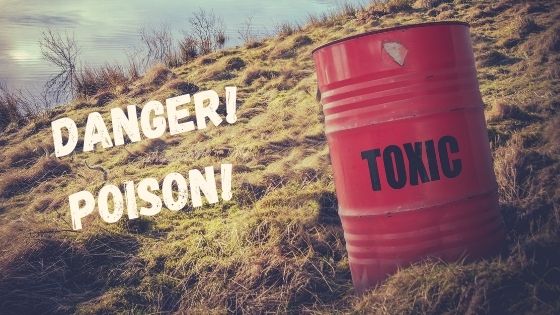18 Signs of a Toxic Relationship

No one purposely takes poison – even in small amounts.
We know it’s stupid.
But we often stay stuck in toxic relationships that make us mentally and emotionally sick and sometimes even destroy us.
Toxic relationships can happen anywhere relationships occur – with a child or parent, in dating or marriage, with a friend or in a work environment, and yes, even in church.
Recognising a toxic relationship can be difficult because we may be so used to mistreatment that it feels normal. The toxic person can make us feel like we are the problem. And naming the toxicity can be hard because we may actually love the person who is being toxic.
Signs of a toxic relationship
To help you recognise a toxic relationship, here are some signs to look out for: [i]
- You’re constantly being blamed for what you did wrong, what you didn’t do enough of, or simply who you are.
- You feel like you’re the recipient of constant criticism about what you’re wearing, what you’ve said, how you act, etc.
- Your significant other/friend often gets jealous and possessive of you.
- You feel like you’re being controlled by the other person rather than given the freedom to make decisions for yourself and interact with others.
- The relationships leaves you feeling emotionally drained and empty more often than not.
- The relationship is marked by conflict but it never gets resolved and never moves into healing and change. You find yourself making excuses and giving the benefit of the doubt again and again yet nothing seems to change.
- Your significant other/friend never takes responsibility for her role in the conflict/problem and you always feel like you’re the one in the wrong.
- You feel like you’re not being heard or allowed to express your emotions or needs. You have a hard time bringing up your concerns or needs because you’re afraid you won’t be heard or your partner/friend will get angry or upset.
- You can’t trust your significant other/friend because their actions are consistently hurtful.
- You find yourself as the main one giving, initiating, and working in the relationship and receiving very little in return. Your partner/friend takes more than they give.
- Your family and other friends have expressed concern over the health of your relationship. People on the outside can often see what you can’t.
- You have a hard time setting boundaries and continue to turn a blind eye to the negativity by engaging in the relationship again and again.
- You feel worse about yourself as the relationship goes on.
- The person has chronic anger issues and uses it to control you. They use sarcasm and disparaging humour (jokes at your expense). They may also use the silent treatment as “punishment”.
- Your friend/partner breaks you down in public, or tells your secrets to family and friends.
- The person has excessive insecurity and needs constant reassurance from you, leaving you feeling drained or smothered.
- The person is extremely opinionated and is judgmental and critical of everyone, including you.
- Your friend/partner uses guilt to manipulate you. They use If-Then statements – “If you hadn’t done this then I wouldn’t have been angry with you”.
What to do with a toxic relationship
Have you recognised any toxic relationships in your life? Do you lie awake at night rethinking conversations, feeling hurt and discouraged? Here’s what you can do:
Take a break from interactions
Reflect on what bothers you about the relationship. How do you feel when you are away from the person? Do you miss them? What do you miss?
Create emotional distance
Pull yourself back a little and create some emotional space between you by interacting minimally. Give the person less power over you and stop allowing them to make you feel a certain way. You can’t change other people’s behaviour, only your own reaction to their behaviour. Think for yourself and maintain your individuality.
Look at your contribution to the situation
What are you doing to keep the drama going? Are you picking fights? Goading? Retaliating? Tolerating mistreatment? Are you allowing your boundaries to be violated? Changing your own behaviour can significantly improve the relationship.
One caveat though: This doesn’t mean you change yourself to the point of losing your individuality or allowing yourself to be abused. Letting yourself be abused enables the abuser.
Get professional help
It is not a sign of weakness to get professional help. Get a third party to help you work through your issues and see clearly what you can do to change the relationship dynamic. [ii]
Be warned though, not all relationships can be fixed. Sometimes you have to walk away and limit your exposure to a toxic person.
Sometimes you can only grieve over a relationship instead of fixing it.
And one last caveat: It’s important not to apply the “toxic” label too quickly. Just because someone bugs you doesn’t make them toxic (we all have toxic moments). A difficult person may irritate or hurt you, but you will be able to resolve issues between you and see change.
Toxic behaviour is long-term, repeated behaviour that breaks you down as a person.
In summary, “Toxic people, by definition, don’t respect the personhood of others.” [iii]
Realising the personal effect someone has on you is all you really need to know. Then do something about it so that it doesn’t destroy you.
For more on domestic abuse read Common Signs of Domestic Abuse
Do you recognise any of these signs? Do any of your relationships leave you feeling drained, used, or manipulated?
[i] Source: adapted from: https://truelovedates.com/signs-of-a-toxic-relationship/
[ii] Adapted from Dr Tracey Marks, https://www.youtube.com/watch?v=XxtSVM1c_HU
[iii] Gary Thomas, When to Walk Away, 127



Common Signs of Domestic Abuse - Love More to Live | 1st Jul 20
[…] written about toxic relationships, but an abusive relationship takes toxic to another […]